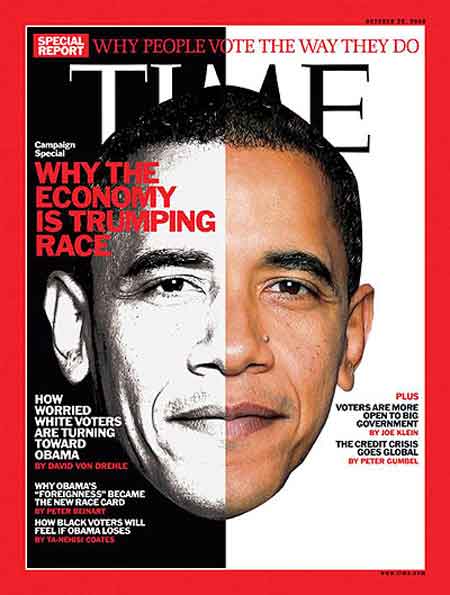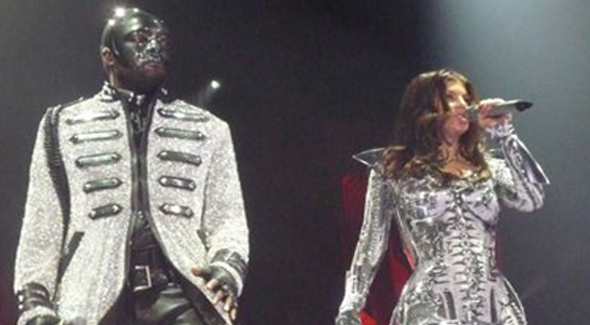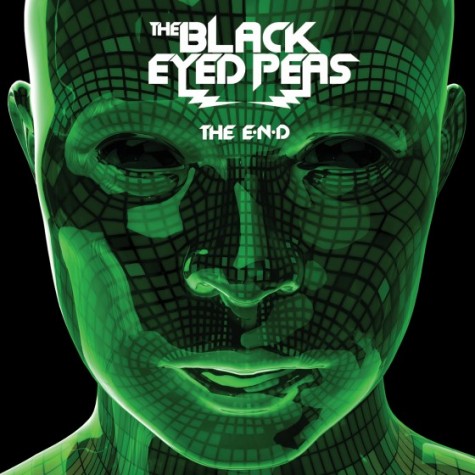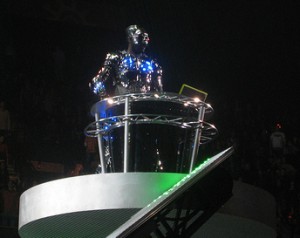Last month, I went to see the Black Eyed Peas on their “The E.N.D.” (energy never dies) tour. Though I’m not a huge fan of BEP, the show was spectacular in the literal sense – a gluttonous feast for the eyes made up of lasers, giant screens full of glorious CGI, dancers dressed in a variety of weird costumes and a light cycle. On top of that, like it or not, the music was catchy as hell. But beyond being an enjoyable evening, the concert raised an interesting question: are we living in a post-racial America?
Early on, I noticed something that made me start Overthinking. The band is diverse, made up of African-American will.i.am, Filipino-American Apl.de.ap, Mexican/Native American Taboo and Mexican/Scottish/Irish/Native American Fergie. Looking around at the sold-out crowd of 22,000 at the Wachovia Center, I saw that the crowd echoed the band and that I was standing in the most diverse group of people I’ve ever seen, including the 2008 Democratic National Convention.
Black, white, Asian, Hispanic; children, teens, adults, seniors; gay, straight, trans; rich, poor, middle class – EVERYONE came to this show.
And, it seems, EVERYONE was listening at home too.
From Wikipedia: “In 2009, the group became one of only eleven artists to have ever held the number one and two spots on the Billboard Hot 100 at the same time with their singles “Boom Boom Pow” and “I Gotta Feeling”, from the album The E.N.D., and the singles also topped the chart for an unprecedented 26 consecutive weeks combined in 2009. The album later produced a third Hot 100 number one with “Imma Be”, making them one of the few groups to ever place three number ones on the chart from the same album.”
Clearly, this band has done something special. They’ve appealed to an incredible demographic range and made an extraordinary amount of money doing it. As I sat there in the crowd, Voodoo rapping above my head on his light cycle, I wondered if it Black Eyed Peas might not represent a truly post-racial band and if that was the secret of their success.
Fergie’s a big part of that success. Great voice, astounding dancer, fun personality, lots of presence, sings about lovely lady lumps while caressing said lumps in a very provocative way. The fact that the band spent eight years in relative obscurity before taking off in 2003 when Fergie joined certainly points to the Fergie theory, but that’s not the whole story. She’s got the moves, the looks and the talent to be a big success, but so do a lot of other singers who don’t have three singles hit #1 off a single album.
If not Fergie, than it must be will.i.am, who does most of the talking both on and off stage. Five minutes into the concert, it was clear that will.i.am was the soul of the group and the aesthetic force behind the music and the show.
As I was thinking about this, the lights went out and something wonderfully strange happened. Out of the darkness a massively autotuned voice asked the crowd: “do you mind if I turn this arena into a nightclub?” The crowd responded in an indecipherable howl. Then, up from the floor rose will.i.am on a hydraulic saucer, dressed a lot like Robocop, lasers shooting from the sides of his head.
For the next 20 minutes, will.i.am mixed a dance party and the crowd went wild. The songs he played weren’t Black Eyed Peas tunes. They didn’t come from his roots in the LA hip-hop scene or even from modern pop. Nope. Instead, this African-American man dressed as a robot sent this multi-ethnic crowd into fits of joy with the greatest hits of white America from the 70s, 80s and 90s. On the set list: Guns ‘n Roses’s “Sweet Child of Mine,” Journey’s “Don’t Stop Believin’,” Nirvana’s “Smells Like Teen Spirit,” and the Eurythmics’s “Sweet Dreams (are made of this).”

“Where’s the Love?”
So, on the “yay, we’re post-racial” side of the ledger, we have a multi-racial band with a diverse audience promoting non-discrimination and tolerance in its lyrics. will.i.am has proven an unusually engaged and thoughtful member of the celebrity class, dedicating himself to progressive causes. He and the band are working with a number of environmental organizations to promote recycling and to build support for the upcoming Clean Energy/Global Warming bill in Congress.
Moreover, with his famous “Yes We Can” video during the 2008 campaign, he tied himself to the primary subject of the “post-racial” discussion, Barack Obama.
Supporting the hypothesis of a post-racial will.i.am was this piece from early in the show. Text messages from the crowd scrolled up on giant screens and will.i.am worked them into his rap, become the living voice of the multi-racial multitude. It was cool, impressive and, as I’ve learned from watching videos from a number of different cities, genuinely impromptu.
The other piece of support for the post-racial thesis was that, at the end of the show, will.i.am personally recognized every dancer and musician on the stage and thanked the backstage crew. He thanked dozens of people and, frankly, killed the momentum of the end of the show, but I was impressed that he took the time to do it. While not technically about race, it suggests the band’s appreciation of the contributions of everyone involved. Failure to appreciate each others’ contributions is one of the underlying causes of America’s racial and political tensions.




So will.i.am, a black man, puts on a robot costume to perform white rock music from the 70’s. To me, that’s less a racial thing as it is a temporal thing: as a futuristic robot, he brings old music to the present through technology.
Okay, that’s not really Overthinking It, and I’d be remiss in my duties as the token OTI minority if I didn’t address the race angle:
I tend to dismiss this idea of the imminence of “post-racial America” as the fantasy of white people who wish that America’s awful history of racism and present of racial inequality can be easily swept under the rug and forgotten about.
“Hooray, there’s no more racism. Obama’s the President and I’m listening to the Black Eyed Peas. Fight’s over. Now can we stop talking about race? It’s making me uncomfortable.”
Electing Obama to the Presidency and listening to the Black Eyed Peas? Those are easy things. Hiring African Americans in positions of authority in major public and private institutions? Not so easy. Allowing your daughter to date a black guy? Not so easy.
That is to say, it’s going to take decades upon decades for some deeply embedded, subconscious racial prejudices to be extricated from our minds, if they ever will at all. Hopefully, things like a black president and multiracial pop acts can help chip away at those things.
That is to say, Obama and the BEP are “leading indicators”; i.e., the shape of a future that is not fully realized in the present.
Totally unrelated side note 1: the website http://will.i.am/ actually exists, and I’m sure the cybersquatting owner of this site is desperately hoping to cash in on this thing.
Totally unrelated side note 2: “From the Cylons to the Replicants to the I, Robot robots to the machines in the Matrix, popular culture often warns us of the danger of subjugating a conscious race.”
..ahem…*cough*…SKYNET….*cough*….ahem
I tend to dismiss this idea of the imminence of “post-racial America” as the fantasy of white people who wish that America’s awful history of racism and present of racial inequality can be easily swept under the rug and forgotten about.
“Hooray, there’s no more racism. Obama’s the President and I’m listening to the Black Eyed Peas. Fight’s over. Now can we stop talking about race? It’s making me uncomfortable.”
This.
Beyond lee wrote, I don’t even know what post-racial is supposed to mean. I mean, how does writing about race (through anti-racism, etc.) make race not exist anymore? How can posts about being “post-racial” talk so much about race?
While I agree with the notion that there is no such thing as “post-racial,” from an advocate’s perspective (and sort of to play DEVIL’S advocate), the multiculturalism in the BEP phenom. is a step in the right direction.
I couldn’t help but think of the possibility that the robot costume is a race-neutral skin: he’s not hiding his race so much as eliminating the possibility of it being a label, for robots are non-racial. But the song choice while wearing it makes that one a little hard to easily swallow, I’ll admit.
Nobody cares about race, if the person in question has already proven him or herself sufficiently talented, entertaining or useful. You can’t look at the way people react to an extremely successful musician and the president of the United States and use that to draw broad conclusions about the prejudices of ordinary people against other ordinary people.
I honestly know nothing about this but weren’t the Black Eyed Peas a critically acclaimed, ‘conscious’ hip-hop group before Fergie joined?
like how Chumbawumba spent decades as anarchist punks
I just discovered this website and let me say for reading this article first it’s incredibly accurate to some of my thought flow as of late.
I recently stumbled upon the old 2007 incident of a white teacher using the N-word on an African American student in school and strangely enough even later that night saw the Boondocks episode of that same situation. Now being that it was 3 years ago it’s still rather relevant compared to the history of this entire issue. My stance on the subject is simply that I can’t believe many African Americans have not heard or have not used this word in a positive way with one another simply to carry on conversation just like anyone would with their friends. Now the fact that it is said by a white person should be of no issue because bringing up that point is racist on its own. Now I’m entirely denying the fact that he is a teacher right now because that is entirely another matter quite honestly and isn’t really the point of this racial situation.
The point is people are people and should act and be treated as people and just because one race may act in one way it does not give them sole rights to act that way and not expect it to possibly be mimicked. I’m not making any accusations that either the student nor the teacher was technically breaching any racial situation because by noticing and bringing out the situation is racial, I can’t say it any other way really =/.
In the same sense I’ve recently thought about some of the illegal immigration going on in the U.S. (because racism is not solely a white vs. black idea) and how there is the growing issue of Hispanics illegally immigrating into the U.S. Granted this has been going on for many many years but is showing no signs of stopping and to some extent it may seem racist or inhumane by U.S. citizens to say “Stop illegally immigrating to our country” when the Hispanics say “Our families are starving and we need money to live that we aren’t getting in our country.” In this situation both sides have a completely valid point but it generally may seem racist for U.S. citizens to criticize Hispanics on the issue when truly it isn’t. I think the issue is that we recognize the trouble that Hispanics are going through but the fact is this country is its own country with an operating government that sets laws for a reason and our law sets a limit on immigration that occurs in the U.S. and sets up a method of legally becoming a citizen. I think we all understand this process takes time and it does so for good reasons so as to maintain a stable growth and create balance in our economy. Because of this, I don’t think it gives anyone the right to break this process regardless of the situation.
Even in this sense the conclusion I still come to is that people are people and should act and be treated as people with decency. I think it’s great to take a dualistic approach to all situations and it’s a must in racial situations especially because there are always two sides of a story.
As far as the BEP’s, I went to their concert in Norman Oklahoma when they opened for U2 and I’m in the same boat that I’m not a huge fan but it is surely entertaining to watch and they do have some excellent music. I think they are doing a great job of establishing a post-racial America and are definitely helping by breaking that barrier but the issue still is young in the process but is coming along rather quick in my opinion.
I’m sure there’s several other issues that could be looked at and discussed that are relevant to this topic yet sadly this is only a comment not a forum -_-, but great article I enjoyed the thoughts and ideas :).
1. white supremacists: still exist in the u.s. and violent groups have been on the rise since the recession/election.
2. the border policies ARE racist, and mexican poverty is a direct result of united states imperialism.
3. what do you think a lot of soldiers (i’m not just blaming them personally) call afghans when they shoot them? ragheads, sandniggers, etc etc. islamaphobia is a serious racist phenomenon encouraged by state, media, christian fundamentalists among others.
if americans are becoming post-racialist, it is because they are denying the racism going on all around them. look at how many black people are in prisons as a proportion of prison populations, look at how angry so much hip hop is. the black eyed peas had to tone down political edge to get record deals, it’s very simple. look at what happened to public enemy after ‘fight the power,’ and you’ll see how the industry works.